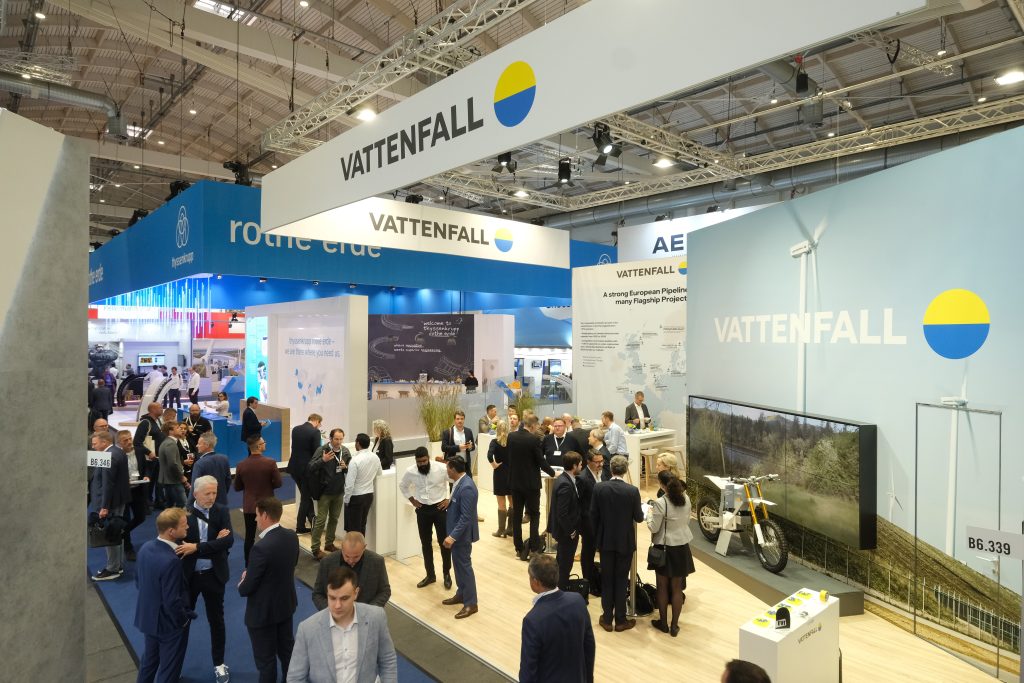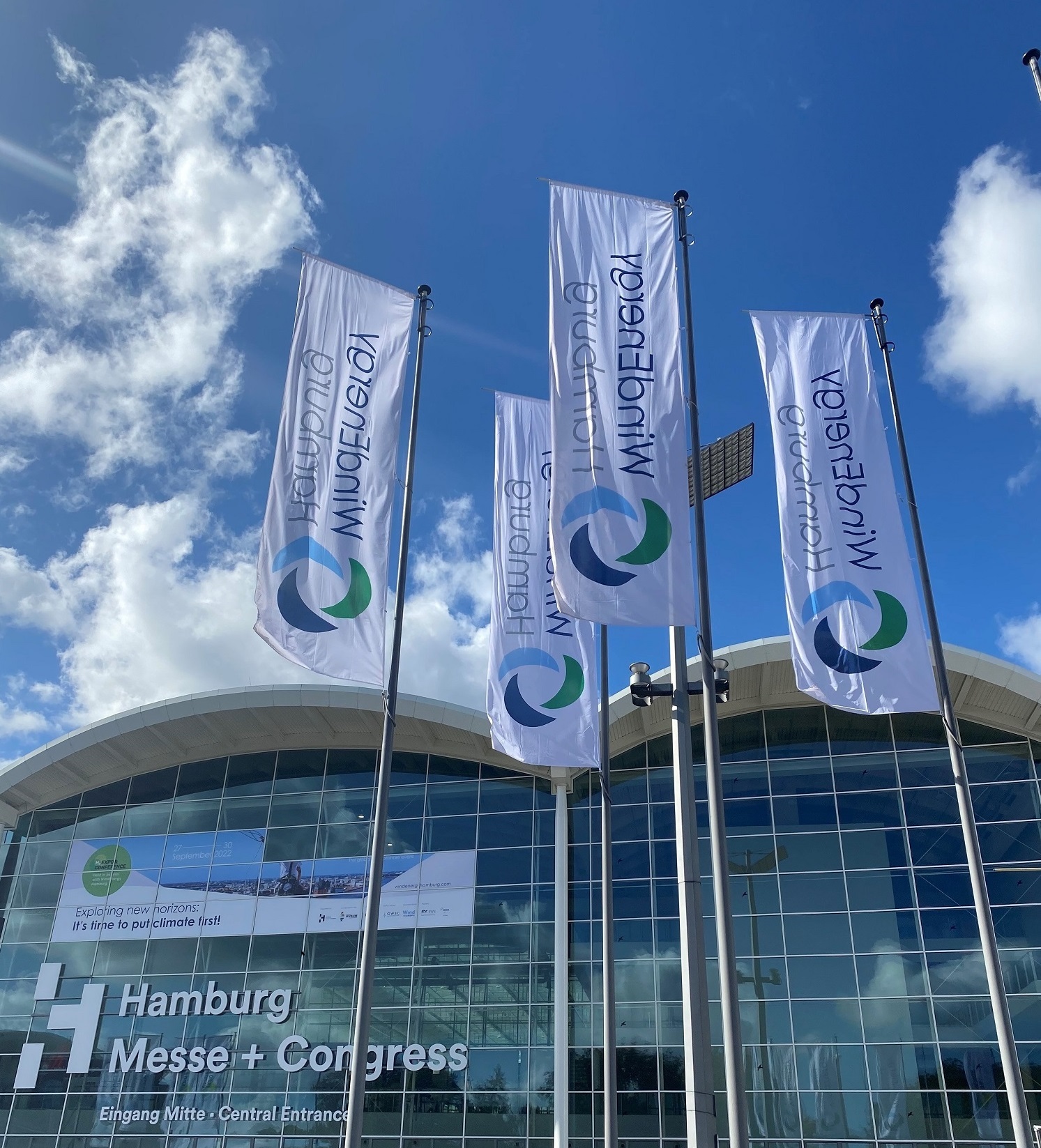Two thirds of Europe’s wind energy capacity is located onshore, but the offshore segment is catching up. As much as 40 gigawatts could be added this year alone. This brings huge business potential to the industry, and WindEnergy Hamburg provides a perfect platform to make it all happen.
Steady winds and sufficient space for large, powerful wind turbines: The expansion of offshore wind plays a key role in the efforts to achieve the climate goals. In 2023, the output of all of the world’s offshore wind energy units reached a total of 75.2 gigawatts. According to the Global Wind Energy Council’s Global Wind Report 2024, offshore capacity around the globe will triple by 2028, adding 138 GW. But to limit global warming to 1.5 degrees, political and industrial leaders must take more decisive steps, says GWEC Chairman Jonathan Cole. “This means that countries must take action to accelerate the use of renewable energy by prioritising timely investments in grid and transmission infrastructure while simplifying permitting procedures quickly,” says Cole.
The European Union is already supporting the wind sector through its “Wind Power Package” which comprises 15 urgent measures. In 2023 the European offshore wind capacity made a significant jump up, expanding by 40 per cent. “Last year was a milestone for offshore wind energy in Europe, with more new wind turbines connected to the grid than in any year before,” says Stefan Thimm, Managing Director of the German offshore wind farm operators association, BWO. New development areas equivalent to 40 gigawatts might be auctioned off in 2024, the BWO head added. This opens up an enormous growth potential for the sector.
WindEnergy Hamburg from 24 to 27 September 2024 will be the perfect platform to drive these efforts. “From equipment and component manufacturers to project developers and operators, and through to scientists and politicians, we bring the decision makers together and provide an optimal environment for business networking,” says Andreas Arnheim, Director WindEnergy Hamburg. Out of 1,500 exhibitors from 40 countries, 40 per cent are active in the offshore segment, Arnheim adds.
This includes Vattenfall: The energy company was general contractor for the implementation of one of the world’s largest wind farms. Several innovative, sustainable methods were applied during construction of the 1.5 GW Hollandse Kust Zuid project in the North Sea, which consists of 139 Siemens Gamesa turbines. This included the use of a double bubble veil to dampen underwater noise, larger water holes in the foundations to provide habitats for sea creatures, and turbines fitted with recyclable rotor blades.
Companies like JDR Cable Systems are well familiar with the challenges of offshore wind turbine construction. The British enterprise specialises in the production of dynamic cables for floating wind turbine projects. Over a period of 15 years they supplied more than 4,000 kilometres of underwater cable capable of transmitting 14 GW of offshore wind power. In many of their projects they cooperate with the world-leading wind farm construction company, Ørsted. It was Ørsted, headquartered in Denmark, who built the world’s first offshore wind farm, Vindeby. In those days a wind turbine was 35 metres tall and had a nominal capacity of around 45 kilowatts. The units Ørsted erects today are among the world’s biggest. Boasting rotor diameters of 200 metres, they can each generate as much as eleven megawatts.

More power – more problems?
The growing capacity of offshore wind farms confronts electricity network operators with major challenges, however. Expanding the networks and establishing smart grids that can avoid bottlenecks in the energy supply are considered as key factors for the success of the energy transition.
This topic will most likely be among the top items on the conference agenda at WindEnergy Hamburg. “There is vigorous government support for expanding offshore wind energy, but the politics surrounding grid access and grid connections, in particular hybrid grid connections, is complicated. It is essential to resolve the cost-sharing issue as soon as possible. Otherwise EU risks losing investments,” says WindEurope CEO Giles Dickson. The European Wind Energy Association will be involved in the programme on the Energy Transition Stage in Hall B6, among other activities.

All in all, 150 conferences and panel discussion are planned for WindEnergy Hamburg, covering topics such as grid connections, finance, equipment technology, regulatory matters, supply chains, digitalisation/AI and project planning. The stages will be accessible to trade fair attendees free of charge. “International cooperation, dialogue and fair competition will always be the foundation of the energy transition. We want to contribute to this through our concept of open, freely accessible conferences without any extra costs for attendees,” says Arnheim.
About WindEnergy Hamburg
Every two years one of the most fascinating industries meets for the leading global networking event for wind energy: At WindEnergy Hamburg, which takes place right in the heart of the vibrant northern German port city, around 1,500 companies from 40 countries present their innovations and solutions in ten exhibition halls to up to 40,000 visitors from 100 different nations. Covering 73,500 m² across the exhibition campus, equipment manufacturers and suppliers representing all stages of the onshore and offshore wind energy value chain provide a comprehensive overview of the market. The trade fair will be accompanied by conference sessions where top-ranking experts address the industry’s current key topics. The WindEnergy Hamburg team develop this programme jointly with their partners, including the Global Wind Energy Council (GWEC), the European organisation WindEurope, the national industry associations VDMA and BWE, leading industry media, and companies from the wind energy sector. From 24 until 27 September 2024, all conference sessions will take place free of charge on five open stages located inside the exhibition halls.
Contact:
Uta Westermann
Press & PR
Tel. +49 40 3569-2098
Fax +49 40 3569-69 2098
Send e-mail


























